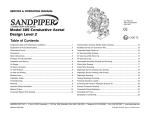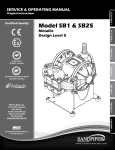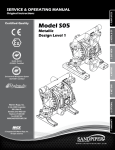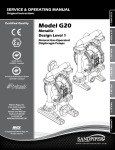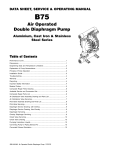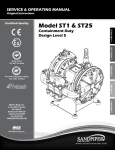Download Model 41-818831 Conductive Acetal Ball Valve Pump
Transcript
SERVICE & OPERATING MANUAL Original Instructions Model 41-818831 Conductive Acetal Ball Valve Pump II 2 G c T5 G c T5 IIII 3/2 2GD T5 II 2 D c T100°c Table of Contents Engineering Data and Temperature Limitations........................................................1 Air Valve Assembly Drawing....................................................................................10 Warranty Information.................................................................................................1 Air Valve Assembly Parts List..................................................................................10 Performance Curve...................................................................................................2 Air Valve Servicing...................................................................................................11 Dimensions................................................................................................................3 Pilot Valve Servicing................................................................................................12 Metric Dimensions.....................................................................................................3 Intermediate Assembly Drawing and Servicing.......................................................13 Principle of Pump Operation.....................................................................................4 Check Valve Drawing..............................................................................................14 Installation and Start-up............................................................................................4 Check Valve Servicing.............................................................................................14 Air Supply..................................................................................................................4 Diaphragm Service Drawing, with Overlay..............................................................15 Air Valve Lubrication..................................................................................................4 Diaphragm Servicing...............................................................................................16 Air Line Moisture.......................................................................................................4 Overlay Diaphragm Servicing .................................................................................16 Air Inlet and Priming..................................................................................................4 Pumping Hazardous Liquids...................................................................................17 Between Uses...........................................................................................................4 Converting the Pump for Piping the Exhaust Air.....................................................17 Troubleshooting ........................................................................................................5 Exhaust Conversion Drawing..................................................................................17 Important Safety Information.....................................................................................6 Converted Exhaust Illustration................................................................................17 Composite Repair Parts Drawing..............................................................................8 Grounding the Pump...............................................................................................18 Overlay Option Drawing, Muffler Option Drawing.....................................................8 EC Declaration of Conformity - Machinery..............................................................19 Available Service and Conversion Kits......................................................................8 EC Declaration of Conformity - ATEX......................................................................20 Composite Repair Parts List......................................................................................9 Explanation of ATEX Certificate...............................................................................21 Binks • 195 International Blvd. • Glendale Heights, IL 60139 USA • Telephone: 1.800.99.BINKS, 630.237.5000 Toll Free Customer Service and Technical Support: 800-992-4657 • Toll Free Fax: 888-246-5732 Part Sheet 77-2995 Model 41-818831 Conductive Acetal Ball Valve Pump Air Operated Double-Diaphragm Pump II 2 G c T5 G c T5 IIII 3/2 2GD T5 ENGINEERING, PERFORMANCE & CONSTRUCTION DATA II 2 D c T100°c Intake/Discharge Pipe Size 1/2" NPT(Internal) or 1/2" BSPT (Tapered) 1" NPT(External) or 1" BSPT (Tapered) Capacity 0 to 14 gallons per minute (0 to 52 liters per minute) Air Valve No-lube, no-stall design Solids-Handling Up to .125 in. (3mm) CAUTION! Operating temperature limitations are as follows: Materials Heads Up To 100 psi or 231 ft. of water (7 Kg/cm2 or 70 meters) Displacement/Stroke .014 Gallon / .053 liter Operating Temperatures Maximum* Minimum* General purpose, oil-resistant. Shows good solvent, oil, water and hydraulic fluid resistance. Should not be used with highly polar solvents like acetone and MEK, ozone, chlorinated hydrocarbons and nitro hyrdrocarbons. 190° F 88° C -10° F -23° C Chemically inert, virtually impervious. Very few chemicals are known to react chemically with PTFE- molten alkali metals, turbulent liquid or gaseous fluorine and a few fluoro-chemicals such as chlorine trifluoride or oxygen difluoride which readily liberate free fluorine at elevated temperatures. 190° F 88° C -20° F -29° C High tensile material with excellent abrasion resistance. A general purpose material with excellent resistance to most oils. Injection molded thermoplastic elastomer with no fabric layer. Long mechanical flex life. Excellent abrasion resistance. 220° F 104° C -35° F -37° C 180° F 82° C -35° F -37° C 275° F 135° C -40° F -40° C CAUTION: Nonmetallic pumps and plastic components are not UV stabilized. Ultraviolet radiation can damage these parts and negatively affect material properties. Do not expose to UV light for extended periods of time. BINKS® pumps are designed to be powered only by compressed air. Maximum and Minimum Temperatures are the limits for which these materials can be operated. Temperatures coupled with pressure affect the longevity of diaphragm pump components. Maximum life should not be expected at the extreme limits of the temperature ranges. Warranty Information 5-YEAR Limited Product Warranty Binks® manufacturing warrants to the original end-use purchaser that no product sold by Binks shall fail under normal use and service due to a defect in material or workmanship within five years from the date of shipment from Binks factory. See complete warranty at www.binks.com B41-818831conductiveacetal-rev0113 Model 41-818831 Conductive Acetal Ball Valve Pump Page 1 Performance based on the following: elastomer fitted pump, flooded suction, water at ambient conditions. The use of other materials and varying hydraulic conditions may result in deviations in excess of 5%. PSI 2.5 (4.3) 5 (8.5) 90 80 HEAD 5 4 80 70 60 2 0 40 PS I (5 .44 ar) Bar 15 (25.5) ) .08 B 2.72 Ba 20 PSI 10 r) (1.36 B 0 0 B41-818831conductiveacetal-rev0113 30 25 20 15 10 5 9.1 7.6 6 4.5 3 1.5 ar) 40 PSI ( 30 0 .8 B SI (4 20 1 10 (17) I (6 60 P 50 3 PS METERS 6 100 NPSHR 7 100 FEET BAR Performance Curve: BINKS Model 41-818831 Conductive Acetal ar) Air Inle t Pressure 2 4 10 6 8 10 U.S. Gallons per minute 20 30 Liters per minute CAPACITY 40 12 14 50 Model 41-818831 Conductive Acetal Ball Valve Pump Page 2 Dimensions: BINKS Model 41-818831 Conductive Acetal Dimensions in inches (metric dimensions in brackets). Dimensional Tolerance .125" (3mm). DISCHARGE PORT 1/2" NPT (INTERNAL) 1" NPT (EXTERNAL) 10.11 257 7.46 189 (ALSO AVAILABLE IN BSP TAPERED) 3.09 78 1.75 44 MANIFOLD CAN ROTATE 90 FROM VERTICAL CENTERLINE AIR INLET 1/4 FNPT 11.54 293 9.79 249 5.46 139 1.42 36 SUCTION PORT 1/2" NPT (INTERNAL) 1" NPT (EXTERNAL) STANDARD INTEGRAL MUFFLER 1.75 44 .07 2 (ALSO AVAILABLE IN BSP TAPERED) 6.09 155 4X .36 9 MTG. SLOT CONDUCTIVE ACETAL DIMENSIONAL TOLERANCE = .125 [3mm] 4.75 121 B41-818831conductiveacetal-rev0113 Model 41-818831 Conductive Acetal Ball Valve Pump Page 3 Principle of Pump Operation This ball type check valve pump is powered by compressed air and is a 1:1 ratio design. The inner side of one diaphragm chamber is alternately pressurized while simultaneously exhausting the other inner chamber. This causes the diaphragms, which are connected by a common rod secured by plates to the centers of the diaphragms, to move in a reciprocating action. (As one diaphragm performs the discharge stroke the other diaphragm is pulled to perform the suction stroke in the opposite chamber.) Air pressure is applied over the entire inner surface of the diaphragm while liquid is discharged from the opposite side of the diaphragm. The diaphragm operates in a balanced condition during the discharge stroke which allows the pump to be operated at discharge heads over 200 feet (61 meters) of water. For maximum diaphragm life, keep the pump as close to the liquid being pumped as possible. Positive suction head in excess of 10 feet of liquid (3.048 meters) may require a back pressure regulating device to maximize diaphragm life. Alternate pressurizing and exhausting of the diaphragm chamber is performed by an externally mounted, pilot operated, four way spool type air distribution valve. When the spool shifts to one end of the valve body, inlet pressure is applied to one diaphragm chamber and the other diaphragm chamber exhausts. When the spool shifts to the opposite end of the valve B41-818831conductiveacetal-rev0113 body, the pressure to the chambers is reversed. The air distribution valve spool is moved by a internal pilot valve which alternately pressurizes one end of the air distribution valve spool while exhausting the other end. The pilot valve is shifted at each end of the diaphragm stroke when a actuator plunger is contacted by the diaphragm plate. This actuator plunger then pushes the end of the pilot valve spool into position to activate the air distribution valve. The chambers are connected with manifolds with a suction and discharge check valve for each chamber, maintaining flow in one direction through the pump. Installation And Start-up Locate the pump as close to the product being pumped as possible. Keep the suction line length and number of fittings to a minimum. Do not reduce the suction line diameter. For installations of rigid piping, short sections of flexible hose should be installed between the pump and the piping. The flexible hose reduces vibration and strain to the pumping system. A surge suppressor is recommended to further reduce pulsation in flow. Air Supply Air supply pressure cannot exceed 125 psi (8.6 bar). Connect the pump air inlet to an air supply of sufficient capacity and pressure required for desired performance. When the air supply line is solid piping, use a short length of flexible hose not less than 1/2" (13mm) in diameter between the pump and the piping to reduce strain to the piping. The weight of the air supply line, regulators and filters must be supported by some means other than the air inlet cap. Failure to provide support for the piping may result in damage to the pump. A pressure regulating valve should be installed to insure air supply pressure does not exceed recommended limits. Air Valve Lubrication The air distribution valve and the pilot valve are designed to operate WITHOUT lubrication. This is the preferred mode of operation. There may be instances of personal preference or poor quality air supplies when lubrication of the compressed air supply is required. The pump air system will operate with properly lubricated compressed air supply. Proper lubrication requires the use of an air line lubricator set to deliver one drop of SAE 10 nondetergent oil for every 20 SCFM (9.4 liters/sec.) of air the pump consumes at the point of operation. Consult the pump’s published Performance Curve to determine this. and alleviates the icing or freezing problems. Air Inlet And Priming To start the pump, open the air valve approximately 1/2" to 3/4" turn. After the pump primes, the air valve can be opened to increase air flow as desired. If opening the valve increases cycling rate, but does not increase the rate of flow, cavitation has occurred. The valve should be closed slightly to obtain the most efficient air flow to pump flow ratio. Between Uses When the pump is used for materials that tend to settle out or solidify when not in motion, the pump should be flushed after each use to prevent damage. (Product remaining in the pump between uses could dry out or settle out. This could cause problems with the diaphragms and check valves at restart.) In freezing temperatures the pump must be completely drained between uses in all cases. Air Line Moisture Water in the compressed air supply can create problems such as icing or freezing of the exhaust air, causing the pump to cycle erratically or stop operating. Water in the air supply can be reduced by using a point-of-use air dryer to supplement the user’s air drying equipment. This device removes water from the compressed air supply Model 41-818831 Conductive Acetal Ball Valve Pump Page 4 Troubleshooting Possible Symptoms: • Pump will not cycle. • Pump cycles, but produces no flow. • Pump cycles, but flow rate is unsatisfactory. • Pump cycle seems unbalanced. • Pump cycle seems to produce excessive vibration. What to Check: Excessive suction lift in system. Corrective Action: For lifts exceeding 20 feet (6 meters), filling the pumping chambers with liquid will prime the pump in most cases. What to Check: Excessive flooded suction in system. Corrective Action: For flooded conditions exceeding 10 feet (3 meters) of liquid, install a back pressure device. What to Check: System head exceeds air supply pressure. Corrective Action: Increase the inlet air pressure to the pump. Most diaphragm pumps are designed for 1:1 pressure ratio at zero flow. What to Check: Air supply pressure or volume exceeds system head. Corrective Action: Decrease inlet air pressure and volume to the pump as calculated on the published PERFORMANCE CURVE. Pump is cavitating the fluid by fast cycling. B41-818831conductiveacetal-rev0113 What to Check: Undersized suction line. Corrective Action: Meet or exceed pump connection recommendations shown on the DIMENSIONAL DRAWING. What to Check: Restricted or undersized air line. Corrective Action: Install a larger air line and connection. Refer to air inlet recommendations shown in your pump’s SERVICE MANUAL. What to Check: Check, the Externally Serviceable Air Distribution System of the pump. Corrective Action: Disassemble and inspect the main air distribution valve, pilot valve and pilot valve actuators. Refer to the parts drawing and air valve section of the SERVICE MANUAL. Check for clogged discharge or closed valve before reassembly. What to Check: Rigid pipe connections to pump. Corrective Action: Install flexible connectors and a Surge Suppressor. What to Check: Blocked air exhaust muffler. Corrective Action: Remove muffler screen, clean or de-ice and reinstall. Refer to the Air Exhaust section of your pump SERVICE MANUAL. What to Check: Pumped fluid in air exhaust muffler. Corrective Action: Disassemble pump chambers. Inspect for diaphragm rupture or loose diaphragm plate assembly. Refer to the Diaphragm Replacement section of your pump SERVICE MANUAL. What to Check: Suction side air leakage or air in product. Corrective Action: Visually inspect all suction side gaskets and pipe connections. What to Check: Obstructed check valve. Corrective Action: Disassemble the wet end of the pump and manually dislodge obstruction in the check valve pocket. Refer to the Check Valve section of the pump SERVICE MANUAL for disassembly instructions. What to Check: Blocked pumping chamber. Corrective Action: Disassemble and inspect the wetted chambers of the pump. Remove or flush any obstructions. Refer to the pump SERVICE MANUAL for disassembly instructions. What to Check: Entrained air or vapor lock in one or both pumping chambers. Corrective Action: Purge chambers through tapped chamber vent plugs. PURGING THE CHAMBERS OF AIR CAN BE DANGEROUS! Contact BINKS before performing this procedure. Any model with top-ported discharge will reduce or eliminate problems with entrained air. What to Check: Worn or misaligned check valve or check valve seat. Corrective Action: Inspect check valves and seats for wear and proper seating. Replace if necessary. Refer to Check Valve section of the pump SERVICE MANUAL for disassembly instructions. What to Check: Blocked suction line. Corrective Action: Remove or flush obstruction. Check and clear all suction screens and strainers. What to Check: Blocked discharge line. Corrective Action: Check for obstruction or closed discharge line valves. Model 41-818831 Conductive Acetal Ball Valve Pump Page 5 Recycling Many components of Conductive Acetal AODD pumps are made of recyclable materials (see chart on page 10 for material specifications). We encourage pump users to recycle worn out parts and pumps whenever possible, after any hazardous pumped fluids are thoroughly flushed. Important Safety Information IMPORTANT Read these safety warnings and instructions in this manual completely, before installation and start-up of the pump. It is the responsibility of the purchaser to retain this manual for reference. Failure to comply with the recommendations stated in this manual will damage the pump, and void factory warranty. CAUTION Before pump operation, inspect all gasketed fasteners for looseness caused by gasket creep. Retorque loose fasteners to prevent leakage. Follow recommended torques stated in this manual. WARNING Take action to prevent static sparking. Fire or explosion can result, especially when handling flammable liquids. The pump, piping, valves, containers or other miscellaneous equipment must be grounded. (See Page 20) WARNING This pump is pressurized internally with air pressure during operation. Always make certain that all bolting is in good condition and that all of the correct bolting is reinstalled during assembly. WARNING When used for toxic or aggressive fluids, the pump should always be flushed clean prior to disassembly. WARNING WARNING Before maintenance or repair, shut off the compressed air line, bleed the pressure, and disconnect the air line from the pump. The discharge line may be pressurized and must be bled of its pressure. WARNING In the event of diaphragm rupture, pumped material may enter the air end of the pump, and be discharged into the atmosphere. If pumping a product which is hazardous or toxic, the air exhaust must be piped to an appropriate area for safe disposition. B41-818831conductiveacetal-rev0113 Before doing any maintenance on the pump, be certain all pressure is completely vented from the pump, suction, discharge, piping, and all other openings and connections. Be certain the air supply is locked out or made non‑operational, so that it cannot be started while work is being done on the pump. Be certain that approved eye protection and protective clothing are worn all times in the vicinity of the pump. Failure to follow these recommendations may result in serious injury or death. WARNING Airborne particles and loud noise hazards. Wear ear and eye protection. Model 41-818831 Conductive Acetal Ball Valve Pump Page 6 B41-818831conductiveacetal-rev0113 Model 41-818831 Conductive Acetal Ball Valve Pump Page 7 Composite Repair Parts Drawing 11 8 19 Available Service Kits 41-718850 AIR MOTOR REPAIR KIT O-rings, Gaskets, Bumpers, Bushings, Retainers, and Seals 41-718861 DIAPHRAGM KIT Santoprene Backup Diaphragm, PTFE Overlay Diaphragms, PTFE Manifold O-rings, and PTFE Seals for metal check valve seats 41-718854 BALL AND SEAT KIT 316 Stainless Steel Check Balls, 316 Stainless Steel Check Valve Seats PTFE Seals for metal check valve seats 3 20 9 32 22 9 32 21 25 7 10 29 31 4 12 10 28 1 17 10 24 35 30 9 35 6 2 13 27 33 10 15 10 24 10 2 24 35 33 32 35 16 22 32 5 24 9 10 B41-818831conductiveacetal-rev0113 Model 41-818831 Conductive Acetal Ball Valve Pump Page 8 Composite Repair Parts List Item 1 2 3 4 5 6 7 8 9 10 11 12 13 15 16 17 19 Description Qty Air Valve Assembly 1 Ball, Check 4 Pilot Valve Assembly 1 Bracket, Intermediate 1 Bracket, Mounting 2 Bumper, Diaphragm 2 Bushing, Plunger 2 Cap, Air Inlet 1 Capscrew, Flanged 5/16-18 X 1.00 12 Capscrew, Flanged 5/16-18 X 1.25 36 Capscrew, Flanged 1/4-20 X 1.50 4 Capscrew, Flanged 1/4-20 X .75 4 Chamber, Outer 2 Diaphragm, One-Piece Bonded PTFE Elbow, Suction 2 Elbow, Discharge 2 Gasket, Air Inlet 1 Item 2 20 21 22 24 25 27 28 29 30 31 32 33 34 35 Description Qty Gasket, Pilot Valve 1 Gasket, Air Valve 1 Manifold, NPT 2 Manifold, BSPT (Tapered)2 Nut, Flanged 5/16-18 24 O.ring 2 Plate, Inner Diaphragm 2 Plunger, Actuator 2 Ring, Retaining 2 Rod, Diaphragm 1 Seal, Diaphragm Rod 2 Seal, Manifold 4 Seat, Check Valve 4 Grounding Cable 1 Seal, Metal Check Value Seats 8 LEGEND: = Items contained within 41-718850 Air Motor Repair Kits = Items contained within 41-718861 Diaphragm Kits = Items contained within 41-718854 Ball and Seat Kits B41-818831conductiveacetal-rev0113 Model 41-818831 Conductive Acetal Ball Valve Pump Page 9 Air DistributionValve Assembly Drawing MAIN Air Valve ASSEMBLY Parts List Item Description 1 Valve Assembly 1-A Sleeve and Spool Set 1-B Valve Body 1-CBumper 1-D End Cap 1-E Hex Flange Capscrew 1/4-20 x .75 1-FO-ring 1-G Muffler 1-H Muffler Cap 1-I Machine Screw 6-32 x 1.25 1-I 1-H 1-F 1-F Qty 1 1 1 2 2 8 4 1 1 4 LEGEND: 1-G 1-E = Items contained within 41-718850 Air Motor Repair Kits 1-C 1-D 1-A 1-C 1-D 1-E 1-B 1-F 1-F B41-818831conductiveacetal-rev0113 Model 41-818831 Conductive Acetal Ball Valve Pump Page 10 A IR D IS T RI B U T I O N VA LV E SERVICING To service the air valve first shut off the compressed air, bleed pressure from the pump, and disconnect the air supply line from the pump. Step #1: See COMPOSITE REPAIR PARTS DRAWING. Using a 3/8" wrench or socket, remove the four hex capscrews (items 11). Remove the air valve assembly from the pump. Remove and inspect gasket (item 22) for cracks or damage. Replace gasket if needed. Step #2: Disassembly of the air valve. Using a 3/8" wrench or socket, remove the eight hex capscrews (items 1-E) that fasten the end caps to the valve body. Next remove the two end caps (items 1-D). Inspect the two o-rings (items 1-F) on each end cap for damage or wear. Replace the o-rings as needed. Remove the bumpers (items 1-C). Inspect the bumpers for damage or wear. Replace the bumpers as needed. Remove the spool (part of item 1-A) from the sleeve. Be careful not to scratch or damage the outer diameter of the spool. Wipe spool with a soft cloth and inspect for scratches or wear. Inspect the inner diameter of the sleeve (part of item 1-A) for dirt, B41-818831conductiveacetal-rev0113 scratches, or other contaminants. Remove the sleeve if needed and replace with a new sleeve and spool set (item 1-A). Step #3: Reassembly of the air valve. Install one bumper (item 1-C) and one end cap (item 1-D), with two o-rings (items 1-F), and fasten with four hex capscrews (items 1-E) to the valve body (item 1-B). Align hole in end cap with roll pin on valve body. Remove the new sleeve an spool set (item 1-A) from the plastic bag. Carefully remove the spool from the sleeve. Install the six o-rings (item 1-F) into the six grooves on the sleeve. Apply a light coating of grease to the o-rings before installing the sleeve into the valve body (item 1-B), align the slots in the sleeve with the slots in the valve body. Insert the spool into the sleeve. Be careful not to scratch or damage the spool during installation. Install the remaining bumper and end cap (with o-rings), and fasten with the remaining hex capscrews. Align hole in end cap with roll pin on valve body. Fasten the air valve assembly (item 1) and gasket to the pump.Connect the air line to the pump. The pump is now ready for operation. IMPORTANT Read these instructions c o m p l e t e l y, b e f o r e installation and start-up. It is the responsibility of the purchaser to retain this manual for reference. Failure to comply with the recommendations stated in this manual will damage the pump, and void factory warranty. Model 41-818831 Conductive Acetal Ball Valve Pump Page 11 Pilot Valve Assembly Drawing Pilot Valve Assembly Parts List For Models Equipped with Aluminum Midsections ItemDescription Qty 3 3-A 3-B 3-C 3-D 3-E 3-F Pilot Valve Assembly Valve Body Sleeve (With O-Rings) O-Ring (Sleeve) Spool (With O-Rings) O-Ring (Spool) Retaining Ring 1 1 1 6 1 3 1 LEGEND: = Items contained within 41-718850 Air Motor Repair Kits B41-818831conductiveacetal-rev0113 Model 41-818831 Conductive Acetal Ball Valve Pump Page 12 Intermediate Assembly Drawing ACTUATOR PLUNGER Servicing To service the actuator plunger first shut off the compressed air supply, bleed the pressure from the pump, and disconnect the air supply line from the pump. 29 25 7 Step #1: See pump assembly drawing. Using a 3/8 " wrench or socket, remove the four capscrews (items 11). Remove the air inlet cap (item 8) and air inlet gasket (item 19). The pilot valve assembly (item 3) can now be removed. 28 28 25 29 Intermediate Repair Parts List ItemDescription 4 Bracket, Intermediate 7 Bushing, Plunger 25O-Ring 28 Plunger, Actuator 29 Ring, Retaining* Qty 1 2 2 2 2 *Note: It is recommended that when plunger components are serviced, new retaining rings be installed. LEGEND: = Items contained within 41-718850 Air Motor Repair Kits B41-818831conductiveacetal-rev0113 Step #2: Servicing the actuator plungers. See pump assembly drawing. The actuator plungers (items 28) can be reached through the stem cavity of the pilot valve in the intermediate bracket (item 4). To service bushings, o-rings and retaining rings, see Intermediate Drawing. Remove the plungers (items 28) from the bushings (item 7) in each end of the intermediate cavity. Inspect for wear or damage. Replace plunger as needed. Apply a light coating of grease to each o-ring and re-install the plungers in to the bushings. Push the plungers in as far as they will go. Step #3: Re-install the pilot valve assembly into the intermediate assembly. Be careful to align the ends of the stem between the plungers when inserting the stem of the pilot valve into the cavity of the intermediate. Re-install the gasket (item 19), air inlet cap (item 8) and capscrews (items 11). Connect the air supply to the pump. The pump is now ready for operation. Plunger Bushing, O-ring, And Retaining Ring Servicing To service the plunger bushing components first remove the two retaining rings (items 29) using a small flat screwdriver. *Note: It is recommended that new retaining rings be installed. Next remove the two plunger bushings (items 7). Inspect the bushings for wear or scratches. Replace the bushings as necessary. Inspect the two o-rings (25) for cuts and/or wear. IMPORTANT Read these instructions completely, before installation and start-up. It is the responsibility of the purchaser to retain this manual for reference. Failure to comply with the recommendations stated in this manual will damage the pump, and void factory warranty. Model 41-818831 Conductive Acetal Ball Valve Pump Page 13 Check Ball Valve Drawing 9 10 17 24 13 2 33 35 B41-818831conductiveacetal-rev0113 35 Modular Check Ball Valve Servicing Before servicing the check valves, first shut off the suction line and then the discharge line to the pump. Next, shut off the compressed air supply, bleed air pressure from the pump, and disconnect the air supply line from the pump. Drain any remaining fluid from the pump. The pump can now be removed for service. To access the modular check valve, remove the elbows (items 16 and 17 from pump composite repair parts drawing). Use a 1/2" wrench or socket to remove the fasteners. Once the elbows are removed, the modular check valves can be seen in the cavities of the outer chamber (items 13). Inspect the check balls (items 2) for wear, abrasion, or cuts on the spherical surface. The check valve seats (items 33) should be inspected for cuts, abrasive wear, or embedded material on the surfaces of both the external and internal chambers. The spherical surface of the check balls must seat flush to the surface of the inner chamfer on the check valve seats for the pump to operate to peak efficiency. Replace any worn or damaged parts as necessary. IMPORTANT Read these instructions completely, before installation and start-up. It is the responsibility of the purchaser to retain this manual for reference. Failure to comply with the recommendations stated in this manual will damage the pump, and void factory warranty. Re-assemble the check valve Place a check ball (item 2) in the ball cage of either the discharge elbow or the outer chamber. Install a check valve seat in the counter on each end of the chamber. Refasten the elbows to the chamber. Model 41-818831 Conductive Acetal Ball Valve Pump Page 14 Diaphragm Service Drawing, with Overlay 30 10 6 10 27 24 24 14 13 10 10 9 B41-818831conductiveacetal-rev0113 15 14 Model 41-818831 Conductive Acetal Ball Valve Pump Page 15 Diaphragm Servicing To service the diaphragms first shut off the suction, then shut off the discharge lines to the pump. Shut off the compressed air supply, bleed the pressure from the pump, and disconnect the air supply line from the pump. Drain any remaining liquid from the pump. Step #1: See the pump composite repair parts drawing, and the diaphragm servicing illustration. Using a 1/2" wrench or socket, remove the 16 capscrews (items 9 & 10), and flanged nuts that fasten the elbows (items 16 and 17) to the outer chambers (items 13). Remove the elbows with the manifolds and spacers attached. Step #2: Removing the outer chambers. Using a 1/2" wrench or socket, remove the 16 capscrews (items 9 and 10), and flanged nuts that fasten the outer chambers, diaphragms, and intermediate (item 4) together. Step #3: Remove the diaphragm by turning counterclockwise. Inspect the diaphragm (item 14) for cuts, punctures, abrasive wear or chemical attack. Replace the diaphragms if necessary. Step #4: Installing the diaphragms. Make sure the bumper (item 6) is installed over the diaphragm rod. Thread the stud of the one diaphragm clockwise into the tapped hole at the end of the diaphragm rod (item 30) until the inner diaphragm plate is flush to the end of the rod. Insert rod into pump. Align the bolt holes in the diaphragm with the bolt pattern in the intermediate (item 4). Fasten the outer chamber (item 13) to the pump, using the capscrews (items 9 and 10) and flanged nuts. On the opposite side of the pump, pull the diaphragm rod out as far as possible. Make sure the bumper (item 6) is installed over the diaphragm rod. Thread the stud of the remaining diaphragm assembly clockwise into the tapped hole at the end of the diaphragm rod (item 30) as far as possible and still allow for alignment of the bolt holes in the diaphragm with the bolt pattern in the inner chamber. Install diaphragms with convolutions facing towards center of pump. See sectional view on previous page. Fasten the remaining outer chamber (item 13) to the pump, using the capscrews (items 9 and 10) and flanged nuts. Step #5: Re-install the elbow/ spacer/manifold assemblies to the pump, using the capscrews (items 9 & 10) and flanged nuts. The pump is now ready to be re-installed, connected and returned to operation. IMPORTANT Read these instructions completely, before installation and start-up. It is the responsibility of the purchaser to retain this manual for reference. Failure to comply with the recommendations stated in this manual will damage the pump, and void factory warranty. B41-818831conductiveacetal-rev0113 Model 41-818831 Conductive Acetal Ball Valve Pump Page 16 Pumping Hazardous Liquids When a diaphragm fails, the pumped liquid or fumes enter the air end of the pump. Fumes are exhausted into the surrounding environment. When pumping hazardous or toxic materials, the exhaust air must be piped to an appropriate area for safe disposal. See illustration #1 at right. This pump can be submerged if the pump materials of construction are compatible with the liquid being pumped. The air exhaust must be piped above the liquid level. See illustration #2 at right. Piping used for the air exhaust must not be smaller than 1/2" (2.54 cm) diameter. Reducing the pipe size will restrict air flow and reduce pump performance. When the pumped product source is at a higher level than the pump (flooded suction condition), pipe the exhaust higher than the product source to prevent siphoning spills. See illustration #3 at right. Converting the pump for piping the exhaust air The following steps are necessary to convert the pump to pipe the exhaust air away from the pump. The air distribution valve body has 3/8" NPT threads for installation of metal muffler or piped exhaust. Important Installation Note: The manufacturer recommends installing a conductive flexible hose or connection between the pump and any rigid plumbing. This reduces stresses on the molded plastic threads of the air exhaust port. Failure to do so may result in damage to the air distribution valve body. Any piping or hose connected to the pump’s air exhaust port must be groundable and physically supported. Failure to support these connections could also result in damage to the air distribution valve body. Converted Exhaust Illustration PUMP INSTALLATION AREA SAFE AIR EXHAUST DISPOSAL AREA 1" DIAMETER AIR EXHAUST PIPING MUFFLER Illustration #1 MUFFLER LIQUID LEVEL 1 1" DIAMETER AIR EXHAUST PIPING SUCTION LINE Illustration #2 MUFFLER LIQUID LEVEL 1" DIAMETER AIR EXHAUST PIPING SUCTION LINE Illustration #3 B41-818831conductiveacetal-rev0113 Model 41-818831 Conductive Acetal Ball Valve Pump Page 17 Grounding The Pump One eyelet end is fastened to the pump hardware. The other end is installed to a true earth ground. This Ground Strap (Item 34) is shipped with the eyelet end fastened to the pump hardware. To reduce the risk of static electrical sparking, this pump must be grounded. Check the local electrical code for detailed grounding instruction and the type of equipment required. WARNING Take action to prevent static sparking. Fire or explosion can result, especially when handling flammable liquids. The pump, piping, valves, containers or other miscellaneous equipment must be grounded. B41-818831conductiveacetal-rev0113 Model 41-818831 Conductive Acetal Ball Valve Pump Page 18 Declaration of Conformity BINKS, 195 International Blvd, Glendale Heights, IL 60139 certifies that BINKS models: 41-818810, 41-818820, 41-818822, 41-818830, 41-818823, 41-818831 and 41-818836 Air-Operated Double Diaphragm Pumps comply with the European Community Directive 2006/42/EC on Machinery, according to Annex VIII. This product has used Harmonized Standard EN809:1998+A1:2009, Pumps and Pump Units for Liquids - Common Safety Requirements, to verify conformance. Signature of authorized person Charles W. McCulloch Printed name of authorized person Revision Level: E June 8, 2012 Date of issue Engineering Manager Title January 3, 2013 Date of revision EC Declaration of Conformity In accordance with ATEX Directive 94/9/EC, Equipment intended for use in potentially explosive environments. Manufacturer: BINKS 195 International Blvd, Glendale Heights, IL 60139 AODD Pumps For Type Examination Designations, see page 2 (back) Applicable Standard: EN13463-1: 2001, EN13463-5: 2003 KEMA Quality B.V. Utrechtseweg 310 6812 AR Arnhem, The Netherlands DATE/APPROVAL/TITLE: June 11, 2012 Charles W. McCulloch, Engineering Manager EC Declaration of Conformity ATEX Summary of Markings Type BINKS Models: 41-818810 41-818820 41-818822 41-818830 41-818823 41-818836 Marking II 2 G c T5 II 3/2 G c T5 II 2 D c T100oC Type Certificate No. Pumps: KEMA 09ATEX0072 X Listed In KEMA 09ATEX0072 X KEMA 09ATEX0072 X CE KEMA 09ATEX0072 X KEMA 09ATEX0072 X























